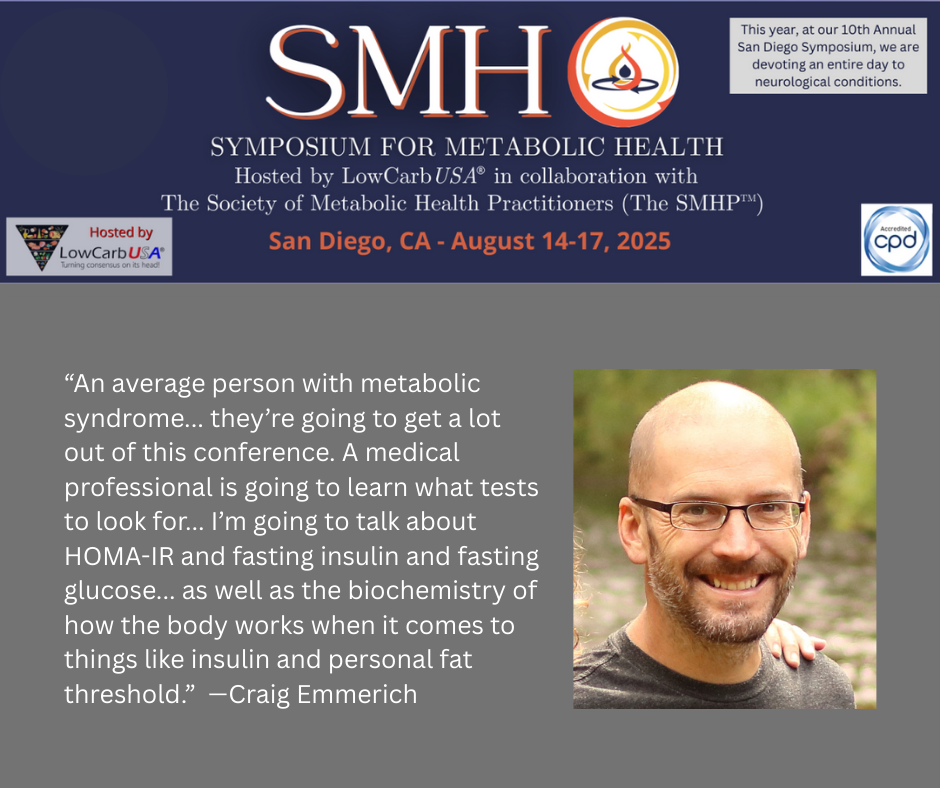His San Diego presentation will explore the overlooked role of insulin, ketones, and the “personal fat threshold” in metabolic dysfunction
If you’ve ever been told insulin is “just a storage hormone,” Craig Emmerich has a message for you: it’s time to take a deeper dive.
Emmerich, a systems-thinking engineer turned metabolic health researcher, is the latest expert added to the roster for the 10th Annual San Diego Symposium for Metabolic Health, happening August 14–17 at the beautiful Loews Coronado Bay Resort.
His upcoming presentation promises to shift the way both practitioners and patients think about insulin—not just what it does, but what it means for long-term metabolic health.
“Insulin is kind of like a thermostat in your house,” Emmerich says. “It’s regulating the amount of fuel that’s in the bloodstream at any given time.”
What Happens When Fasting Insulin Stays High All Day?
In his talk, Emmerich will challenge the conventional focus on post-meal insulin spikes—and instead make the case that chronically elevated fasting insulin is the real metabolic threat.
“Normally you want your fasting insulin to be like five or below,” he explains. “We see people with fasting insulin sitting up there at 30 all day long.”
As an electrical engineer by training, Emmerich brings a systems lens to everything he studies. That includes integrating concepts like insulin load over time—“the area under the curve”—and how it relates to cravings, fat storage, and energy regulation.
“To me, insulin is as much of a hold-back-energy-into-storage hormone as it is a storage hormone.”
Personal Fat Threshold: Why Thin People Get Type 2 Diabetes
Alongside insulin, Emmerich will explore two other misunderstood concepts: ketone metabolism and the personal fat threshold.
“You can have somebody that’s 100 pounds overweight but their metabolic markers look normal,” he says. “And somebody who’s 120 pounds showing all the blood markers of type 2 diabetes. That personal fat threshold theory really explains why that can happen—and understanding it gives people the tools to reverse it.”
He’ll also share a compelling case study of a former client who weighed 645 pounds—but whose blood markers told a completely different story.
A Career Built on Helping Others Reverse Disease
Together with his wife, bestselling author and low-carb pioneer Maria Emmerich, Craig has spent the past 20 years helping people reverse chronic conditions—often using only the free information from their blog.
“I’ve got literally 5,000 testimonies from people who never paid us a dime,” he says. “They just used our free blog and recipes, and reversed PCOS, Parkinson’s, type 2 diabetes—you name it. And in my presentation, I’ll be sharing some of those real stories.”
Beyond the Lectures: Why In-Person Matters
For Emmerich, the value of the San Diego Symposium isn’t just in the science—it’s in the relationships.
“We’ve made lifelong friends at this event,” he says. “You sit down with attendees over dinner, meet people in the hallways, find companies doing things the right way. We’ve met people who ended up becoming close friends, or whose products we now recommend to clients.”
“I’ve never gone to one of these events without learning something new.”
About the 2025 San Diego Symposium for Metabolic Health
This year marks the 10th Annual San Diego Symposium, and it’s shaping up to be one of the most important yet. More than 30 expert speakers will share cutting-edge insights on metabolic health, therapeutic carbohydrate reduction, cardiovascular disease, obesity, diabetes, and more.
The event will also feature a special full-day focus on neurological and psychiatric conditions, showcasing the growing evidence for ketogenic and metabolic therapies in treating cognitive decline, epilepsy, migraines, depression, traumatic brain injury, and other brain-related disorders.
And with both in-person and virtual options available, it’s easier than ever to be part of this powerful community.
Don’t miss Craig Emmerich and the full lineup of experts at the 10th Annual San Diego Symposium for Metabolic Health. Learn more and reserve your seat now.



